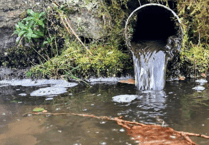My first Welsh teacher had been head of a tiny school in Ceredigion. She went to Lledrod Primary school and Tregaron Secondary. In her days there was only a bus to Tregaron on Monday mornings and back on Friday afternoon. During the week she stayed with an aunt. Nobody is suggesting that we go back to the 1950s.
She and I discussed the merits of small schools. I had taught in village schools in West Sussex. She came from an era of punishment and harshness, something quite alien to me. I believe that the important things children should take away from primary school are a sense of who they are and how they fit into the world of people besides their immediate family. They need to learn to share, to respect other people, to wait turns. They also need to learn important skills like independence, be able to prepare things such as paints and tidy up again, putting things away where they belong. Of course they need to learn to read, write and get to grips with the building blocks of maths, and in enjoyable ways. They need to learn about other cultures, other places, other times, best done through integrated topics. And it’s the teacher’s job to develop a love of learning.
None of the above requires a modern building or even modern technology. Most young children are exposed to too much modern technology in any case. They won’t be left behind if taught in a small village school. Building confidence is far more important. And allowing young children to be part of a community where they feel valued and understood as individuals is vital. I knew all the children in the school, knew their parents too, could spot an upset child in the playground and give extra attention, knowing a mother was undergoing chemotherapy or a dog had died. A small school is like an extended family where children can feel safe.
Village schools play other roles too. The buildings can be used for after school clubs, adult learning in the evenings or meetings. Children can walk or cycle to school, parents can meet; all this helps with making a school the centre of village life. Those villages that have lost their schools seem empty where parents get in their cars and drop the children off at large area Schools.
Since moving to Ceredigion over 24 years ago I’ve seen the closures of many small schools. The first one that made huge headlines was Bryn Herbert, not far from Llanwyryfon that’s currently threatened. The last few parents fought till the bitter end. Talsarn springs to mind where the parents took action and en masse transferred their children to Dihewyd, causing consternation among Ceredigion’s education bosses who ‘punished’ the parents by not providing them with transport help. Of course Dihewyd itself is set to close alongside Ciliau Parc and Felinfach, all part of the scheme to create schools as a matter of ideology. Cilcennin too where a valiant campaign was held but to no avail. The people of Llanwyryfon and other small schools in that area have a massive fight on their hands.
The cost analysis always gets trotted out but I believe it to be a false one. Closing these schools costs the council more for transporting pupils. Last year’s school transport costs increased by 43 percent. Those costs come out of a different budget and it’s public transport that loses out. Closing village schools is a very damaging policy in more ways than loss of community and a threat to the Welsh language. It’s bad for the environment too.


.jpeg?width=209&height=140&crop=209:145,smart&quality=75)


Comments
This article has no comments yet. Be the first to leave a comment.